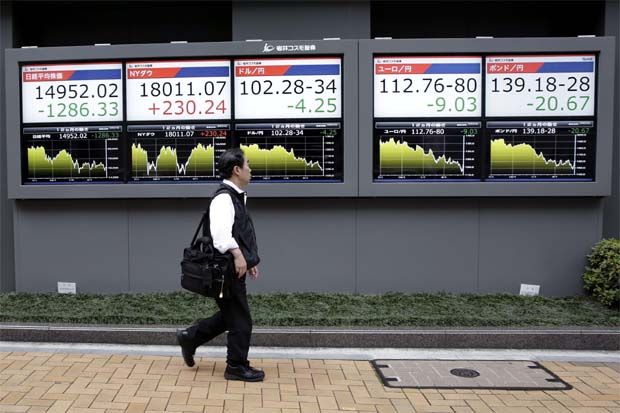Tokyo: Asian stocks steadied on Wednesday, taking a breather after the previous day’s surge, lacking the momentum to keep up with a global rally spurred by gains for tech shares on Wall Street and miners in Europe.
The dollar initially wobbled against the yen following campaign-rally threats by U.S. President Donald to force a government shutdown over funding a border wall, but it eventually squared the losses.
Spread-betters expected a mixed start for European stocks, forecasting Britain’s FTSE would open 0.15 percent lower, Germany’s DAX to start 0.05 percent higher and France’s CAC to open unchanged.
MSCI’s broadest index of Asia-Pacific shares outside Japan, which initially inched up to a two-week high, pulled back to stand little changed following a 0.7 percent rally on Tuesday.
Australian stocks were down 0.3 percent and South Korea’s KOSPI gave back earlier modest gains to slip 0.1 percent.
Japan’s Nikkei bucked the trend and rose 0.3 percent, lifted as the dollar strengthened against the yen.
The Nikkei took its cues from Wall Street, which saw the Dow rise 0.9 percent, the S&P 500 climb 1 percent and the Nasdaq gain 1.4 percent on Tuesday as technology shares rallied.
European stocks had also risen overnight, supported by upbeat results from miners and a weaker euro.
Financial markets have been buffeted in recent weeks by heightened tensions on the Korean peninsula, turmoil in the White House, and growing doubts about Trump’s ability to fulfil his economic agenda.
Stocks, however, continue to attract buyers in an environment where bond yields remain relatively low and companies have largely notched up strong earnings.
The dollar was flat at 109.535 yen, coming off the day’s low of 109.370 plumbed after President Trump told supporters in Arizona “If we have to close down our government, we’re building that wall” in reference to his pledge to tighten immigration at the U.S.-Mexican border.
The greenback stayed clear of a four-month low of 108.605 yen plumbed last week, when turmoil in the White House and geopolitical tensions took a toll on the currency.
The dollar also drew support as U.S. Treasury yields rose and pulled away from two-month lows as some of the risk aversion that gripped the broader markets last week began to ebb.
The dollar index against a basket of six major currencies was little changed at 93.514 after rising 0.5 percent the previous day.
The euro was steady at $1.1759 after slipping about 0.5 percent overnight following weaker-than-expected German investor confidence.
A gathering of global central bankers on Friday in Jackson Hole, Wyoming, has also prompted investors to rebalance their currency positions ahead of the event, leading them to reduce some of their short dollar bets.
Speeches from Fed Chair Janet Yellen and European Central Bank President Mario Draghi will headline the event, although neither are expected to announce any significant policy.
In commodities, Brent crude slipped 0.35 percent to $51.69 a barrel after data from the American Petroleum Institute showed a crude stockpile decline in line with expectations and a surprise build in gasoline inventories.
Improving Libyan output also added to oversupply concerns in the crude oil market.
Copper retreated from a three-year high, and other base metals also fell or trimmed gains, as speculators and funds locked in some profits after a steep rally.
Copper on the London Metal Exchange was down 0.3 percent at $6,562.50 per tonne after striking $6,649 on Tuesday, the highest since November 2014.
Spot gold was a shade higher at $1,285.50 an ounce, after losing 0.5 percent overnight as the precious metal felt the pressure from a stronger dollar. Spot gold had reached a nine-month high above $1,300.00 an ounce on Friday.
























